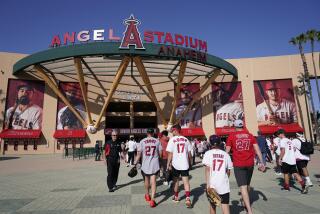Angels Hoping to Stay Flexible
The Angels’ legal defense essentially amounts to two words: So what?
After the first week of testimony in the trial between the Angels and the city of Anaheim, the team’s legal strategy appears clear. In a case that revolves around the meaning of five words in a lease, the Angels have not yet provided evidence to contradict the intent of the two men who negotiated the lease.
Instead, the Angels argue, the intent is irrelevant. The $100-million question, based on the city’s damage estimates, could be this: Does the jury agree?
In questioning those lead negotiators -- former Anaheim city manager Jim Ruth on Monday and former Disney sports chief Tony Tavares on Tuesday -- Angel lawyers focused on the flexibility Disney would retain in a provision requiring the team name to “include the name Anaheim therein.” Disney sold the team to Arte Moreno in 2003.
The city claims that clause precludes the team from calling itself the Los Angeles Angels of Anaheim, because the parties negotiating the lease never intended to allow the addition of another city. If that intent is not expressly included in the lease, the Angels argue, Moreno is not bound by it.
At the conclusion of testimony, Orange County Superior Court Judge Peter Polos will tell the jury whether it can consider that intent in determining whether the Angels broke their lease.
“If the court decides that, based on the evidence, the lease is subject to more than one reasonable interpretation, then he will instruct the jury to determine what the intent of the parties were with respect to the use of Anaheim and any other geographic designator,” said Sheldon Eisenberg of the Santa Monica law firm Bryan Cave.
During the 1996 lease negotiations, Tavares testified, he extracted concessions from the city by promising the Anaheim name would appear prominently in team marketing and “in all the newspapers in the country, and on ‘SportsCenter.’ ”
Tavares said neither he nor Disney chairman Michael Eisner imagined adding another place to the Angels’ name or reserving the right to do so, adding that such a move would be “inconsistent with the purpose” of the lease clause at issue. In his declaration, Tavares said a two-city name “defies the tradition of Major League Baseball.”
With Tavares and Ruth providing similar testimony, Anaheim attorney Andy Guilford said, “The principal negotiators say the lease means what we say it does.”
If the city relied on Tavares’ representations about the prominence of the Anaheim name in marketing and the limits on possible team names, Moreno said, the city should have negotiated those promises into the lease.
“Their whole case is, Tony told us,” Moreno said. “Tony couldn’t get it into the lease.”
Disney refused to accept lease language restricting the team name to Anaheim Angels, Tavares said, so Eisner could choose that name, or Anaheim Mighty Angels, or Angels of Anaheim, or Mighty Angels of Anaheim. The city did not ask that the lease limit Disney to those choices.
In questioning Tavares, Angel attorney George Stephan noted the latter two names did not follow major league tradition, since the home city followed the nickname instead of preceding it.
“Disney absolutely reserved the right not to follow tradition in the name of the team?” Stephan asked.
“Correct,” Tavares said.
Eisner’s initial preference, Tavares said, was the Mighty Angels of Anaheim.
“I thought [that] was only the second-stupidest idea I’ve ever heard in the history of sports,” Tavares said, surpassed only by the Mighty Ducks, the Disney hockey team Eisner named after a Disney movie.
The jury also heard testimony Tuesday from Kevin Uhlich, the Angels’ former chief of business operations. In the weeks after his purchase of the team, Uhlich said, Moreno informed him of a business plan dropping the Anaheim name from marketing and merchandise at once and “at some point introducing the Los Angeles Angels as a name.”
Uhlich said he told Moreno the Dodgers owned the Los Angeles market and asked whether the Angels might become like the Clippers, second fiddle to a more popular Los Angeles team. Moreno fired Uhlich four months later.
More to Read
Go beyond the scoreboard
Get the latest on L.A.'s teams in the daily Sports Report newsletter.
You may occasionally receive promotional content from the Los Angeles Times.







